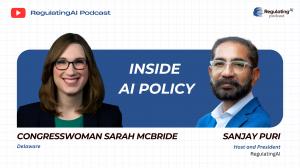Congresswoman Sarah McBride Joins Sanjay Puri to Talk Federal Regulation on The RegulatingAI Podcast
Congresswoman McBride’s message is clear: the future of AI must be guided by democratic values, balanced governance, & a commitment to people—not just progress.
As we pursue innovation in AI we should always be looking at it as often as possible as a complement to human workers and human skill and human talent, not as a replacement.”
WASHINGTON, DC, UNITED STATES, November 24, 2025 /EINPresswire.com/ -- In a recent RegulatingAI Podcast conversation hosted by Sanjay Puri, Congresswoman Sarah McBride offered one of the most grounded and forward-looking perspectives on how the U.S. should shape the future of AI. Their discussion tackled some of the most urgent questions in AI governance—from regulation and innovation to workforce impact and global competition.— Congresswoman Sarah McBride (Delaware)
Finding the “Goldilocks” Approach to AI Regulation
Congresswoman McBride emphasized the need for a regulatory framework that is protective yet innovation-friendly. In her words, the U.S. must pursue a “Goldilocks solution”—rules strong enough to provide guardrails but not so restrictive that they slow down American competitiveness.
She stressed that AI governance must remain human-centered, a departure from what she viewed as previous policies that prioritized corporate interests over people. McBride also made a strong case for federal leadership, noting that a patchwork of state regulations can harm small businesses and emerging innovators. Still, she acknowledged that states like Delaware should retain the ability to act when federal action falls short.
Supporting Small Businesses and Strengthening Research Institutions
A major theme in the discussion was the challenge small businesses face when adopting AI. McBride highlighted how AI integration is capital-intensive, often placing smaller players at a disadvantage. She believes the U.S. government should use its spending power and funding programs to level the playing field.
Institutions like NIST and the National Science Foundation are critical to this mission. McBride underscored the need to protect and fully fund these agencies, as they fuel research, innovation, and public-good technology. She also sees significant potential for bipartisan cooperation, especially in healthcare, education, and regulatory safeguards.
AI Leadership as a Global Democratic Imperative
According to McBride, AI isn’t just a technological competition—it’s a values competition. She framed AI leadership as central to the global struggle between democracy and authoritarianism. If democratic nations lead, AI can be built around privacy, fairness, and accountability. If authoritarian regimes set the standards, AI risks becoming a tool of surveillance and control.
McBride also pointed to the EU as a “laboratory of democracy” in AI, offering a place for the U.S. to learn—adopting what works and discarding overly burdensome rules.
AI and the Workforce: Complement, Not Replace
McBride called for a realistic and people-first understanding of AI’s impact on jobs. AI should enhance human abilities, especially in high-stakes decisions, not replace workers entirely. But she also warned of widening inequality and the potential displacement of white-collar roles.
This shift, she argued, demands serious policy conversations—from strengthening the social safety net to exploring Universal Basic Income (UBI) and portable benefits.
AI in Government: Smarter Services With Human Oversight
AI offers major opportunities to make government more efficient by reducing delays and clearing backlogs. However, McBride drew a clear line: AI must never make high-stakes decisions alone. Areas like criminal justice, immigration, or public benefits require human judgment to avoid bias and harmful outcomes.
The Delaware Model: Innovation Through Collaboration
Finally, McBride highlighted how Delaware’s small size gives it a unique advantage. Leaders can easily bring together businesses, consumers, and innovators to shape policy and create regulatory sandboxes that encourage responsible experimentation.
Upasana Das
Knowledge Networks
email us here
Visit us on social media:
LinkedIn
Instagram
Facebook
YouTube
X
Legal Disclaimer:
EIN Presswire provides this news content "as is" without warranty of any kind. We do not accept any responsibility or liability for the accuracy, content, images, videos, licenses, completeness, legality, or reliability of the information contained in this article. If you have any complaints or copyright issues related to this article, kindly contact the author above.


